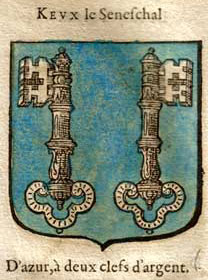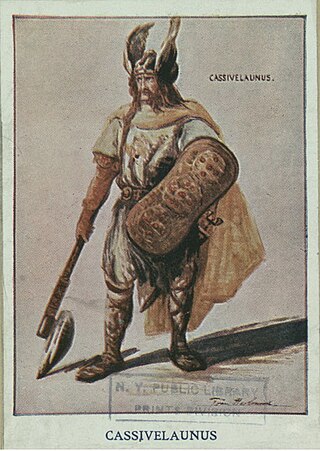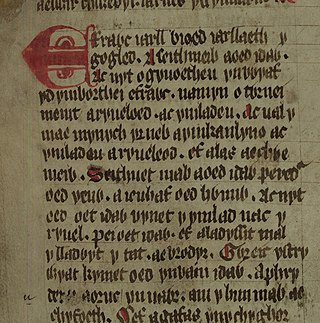Related Research Articles
Manawydan fab Llŷr is a figure of Welsh mythology, the son of Llŷr and the brother of Brân the Blessed and Brânwen. The first element in his name is cognate with the stem of the name of the Irish sea god Manannán mac Lir, and likely originated from the same Celtic deity as Manannán. Unlike Manannán, however, no surviving material connects him with the sea in any way except for his patronymic. Manawydan's most important appearances occur in the Second and Third Branches of the Mabinogi, but he is also referenced frequently in medieval poetry and the Welsh Triads.

Modron ("mother") is a figure in Welsh tradition, known as the mother of the hero Mabon ap Modron. Both characters may have derived from earlier divine figures, in her case the Gaulish goddess Matrona. She may have been a prototype for Morgan le Fay from the Arthurian legend.

Brân the Blessed is a giant and king of Britain in Welsh mythology. He appears in several of the Welsh Triads, but his most significant role is in the Second Branch of the Mabinogi, Branwen ferch Llŷr. He is a son of Llŷr and Penarddun, and the brother of Brânwen, Manawydan, Nisien and Efnysien. The name "Brân" in Welsh is usually translated as crow or raven.
Aneirin, also rendered as Aneurin or Neirin and Aneurin Gwawdrydd, was an early Medieval Brythonic war poet who lived during the 6th century. He is believed to have been a bard or court poet in one of the Cumbric kingdoms of the Hen Ogledd, probably that of Gododdin at Edinburgh, in modern Scotland. From the 17th century, he was usually known as Aneurin.
Pendragon, or Pen Draig literally means 'chief dragon' or 'head dragon', but in a figurative sense: 'chief leader', 'chief of warriors', 'commander-in-chief', generalissimo, or 'chief governor'), is the epithet of Uther, father of King Arthur in the Matter of Britain in medieval and modern era and occasionally applied to historical Welsh heroes in medieval Welsh literature such as Rhodri ab Owain Gwynedd.

In Arthurian legend, Kay is King Arthur's foster brother and later seneschal, as well as one of the first Knights of the Round Table. In later literature he is known for his acid tongue and bullying, boorish behaviour, but in earlier accounts he was one of Arthur's premier warriors. Along with Bedivere, with whom he is frequently associated, Kay is one of the earliest characters associated with Arthur. Kay's father is called Ector in later literature, but the Welsh accounts name him as Cynyr Ceinfarfog.

Cassivellaunus was a historical British military leader who led the defence against Julius Caesar's second expedition to Britain in 54 BC. He led an alliance of tribes against Roman forces, but eventually surrendered after his location was revealed to Julius Caesar by defeated Britons.
The Thirteen Treasures of the Island of Britain are a series of items in late-medieval Welsh tradition. Lists of the items appear in texts dating to the 15th and 16th centuries. The number of treasures is always given as thirteen, but some later versions list different items, replacing or combining entries to maintain the number.

Peredur is the name of a number of men from the boundaries of history and legend in sub-Roman Britain. The Peredur who is most familiar to a modern audience is the character who made his entrance as a knight in the Arthurian world of Middle Welsh prose literature.
Morfran is a figure in Welsh mythology. Usually portrayed as a warrior under King Arthur, he is noted for the darkness of his skin and his hideousness. He appears in the narratives about the bard Taliesin and in the Welsh Triads, where he is often contrasted with the angelically handsome Sanddef.

The Welsh Triads are a group of related texts in medieval manuscripts which preserve fragments of Welsh folklore, mythology and traditional history in groups of three. The triad is a rhetorical form whereby objects are grouped together in threes, with a heading indicating the point of likeness; for example, "Three things not easily restrained, the flow of a torrent, the flight of an arrow, and the tongue of a fool."
Sawyl Penuchel or Ben Uchel, also known as Samuil Penissel, was a British king of the sub-Roman period, who appears in old Welsh genealogies and the Welsh Triads.
The Battle of Arfderydd was fought in medieval Britain in AD 573, according to the Annales Cambriae. The opposing armies are identified in a number of Old Welsh sources but vary between them, perhaps suggesting several allied armies were involved. The main adversaries appear to have been Gwenddoleu ap Ceidio and either the princely brothers Peredur and Gwrgi or King Rhydderch Hael of Strathclyde. Gwenddoleu was defeated and killed in the battle. His bard, Myrddin Wyllt, reportedly went mad and ran into the forest. He is one of several proposed origins for the Arthurian character Merlin. The Welsh Triads refer to this battle as one of the "Three Futile Battles of the Island of Britain", along with the Battle of Camlann and the Battle of the Trees.
Celliwig, Kelliwic or Gelliwic is perhaps the earliest named location for the court of King Arthur. It may be translated as 'forest grove'.
Sanddef Pryd Angel is a figure of Welsh tradition. He usually figures as a warrior of King Arthur's court, and is distinguished by his great beauty, which gives him his epithet Pryd or Bryd Angel.
Pen Rhionydd is named as the location of King Arthur's northern court in a Welsh triad found in Peniarth MS 54, containing pre-Galfridian traditions:
Arthur as Chief Prince in Pen Rhionydd in the North, and Gerthmwl Wledig as Chief Elder, and Cyndeyrn Garthwys as Chief Bishop.
Talhaearn Tad Awen, was, according to medieval Welsh sources, a celebrated British poet of the sub-Roman period. He ranks as one of the earliest, if not the earliest, named poets to have composed and performed in Welsh. The better known poets Aneirin and Taliesin, who may have been slightly younger contemporaries, also belong to this early generation, the first of those known to modern scholars as the Cynfeirdd. Whereas medieval Welsh manuscripts preserve verse composed by or otherwise ascribed to the latter two figures, no such work survives for Talhaearn and in fact, his former fame seems to have largely vanished by the later Middle Ages.
Gwrgi Garwlwyd is a warrior character in Welsh Arthurian legend. He appears in the poem Pa gur and in the Welsh Triads as a fierce warrior, and may have been seen as a werewolf.
Drudwas ap Tryffin is a knight of King Arthur's court in early Arthurian mythology and the owner of the magical Adar Llwch Gwin. His father, Tryffin, is described as the king of Denmark, while his sister, Erdudwyl, was, according to The Death of Drudwas, supposedly a “mistress” of Arthur.
According to Welsh tradition, Afaon fab Taliesin was the son of the bard Taliesin and a member of King Arthur's retinue. He appears both in the Welsh Triads and in the medieval Arthurian tale Breuddwyd Rhonabwy.
References
- ↑ Bromwich, Rachel. Trioedd Ynys Prydein, 2nd Ed., University of Wales Press, 1978, p. 409.
- ↑ Bromwich, Rachel. Trioedd Ynys Prydein pp. 409–410
- ↑ The Mabinogion. Translated by Gantz, Jeffrey. Harmondsworth: Penguin. 1976. p. 142. ISBN 0140443223 . Retrieved 12 April 2020.
- ↑ Englynion y Clyweit.